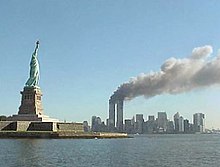
Back Terrorisme Afrikaans Terrorismus ALS Terrorismo AN إرهاب Arabic ارهاب ARZ Terrorismu AST Terrorizm Azerbaijani تروریزم AZB Терроризм Bashkir Teruorėzmos BAT-SMG

Terrorism is the use of fear and violence for political, religious or ideological reasons. Many different types of social or political organizations might use terrorism to try to achieve their goals. People who carry out terrorism are called terrorists. The foundation of modern terrorism is the work of Sergey Nechayev, a Russian radical who developed strategies for carrying out terrorism, which also includes politics.
It is difficult to explain terrorism. Terrorism has no official criminal law definition at the international level. Common definitions of terrorism refer to violent acts which are intended to create fear (terror). The acts may be done for a religious, political, or ideological motive and use illegal violence.[1][2] Some definitions now include acts of unlawful violence and war crimes. The use of similar tactics by criminal gangs is not usually called terrorism. The same actions may be called terrorism when they are done by a politically-motivated group.
There are over 10000 definitions of "terrorism". In some cases, the same group may be described as "freedom fighters" by its supporters and "terrorists" by its opponents. The term is often used by states to criticize political opponents.

One form of terrorism is the use of violence against noncombatants for the purpose of gaining publicity for a group, cause, or individual.[3][4]
According to Memorial Institute for Prevention of Terrorism, terrorists killed 20,498 people in 2006. The major effect of terrorism comes from the fear that is generated.
- ↑ "Terrorism". Encyclopædia Britannica. p. 3. Retrieved 2006-08-11.
- ↑ Ruby, Charles L. (2002). "The Definition of Terrorism" (PDF). Archived from the original (PDF) on 2011-07-25. Retrieved 2010-02-22.
- ↑ Pentagon attack
- ↑ "Flight 77, Video 2". Judicial Watch. Archived from the original on 2009-02-12. Retrieved 2010-05-31.